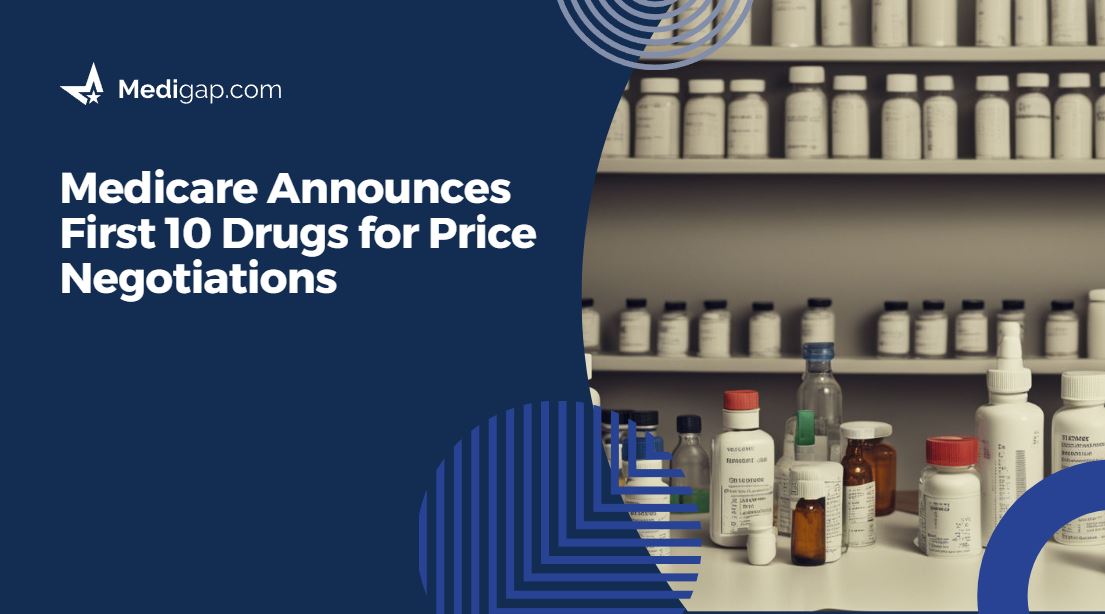
In a groundbreaking move aimed at alleviating the escalating burden of prescription drug costs, the US Department of Health and Human Services (HHS) has unveiled the first 10 drugs that Medicare will target for price reductions through negotiations with pharmaceutical companies. These landmark negotiations have the potential to reshape the healthcare landscape, making life-saving medications more affordable for millions of Americans.
Medicare’s power to negotiate
The authority for Medicare to directly negotiate prescription drug prices has been made possible by the Inflation Reduction Act, a pivotal piece of legislation passed in 2022. This act empowers Medicare to negotiate prices with pharmaceutical companies, marking a historic departure from the previous system.
While the negotiations are scheduled over the next two years, the prices resulting from these negotiations will be announced by September 1, 2024. However, beneficiaries won’t see the lower drug prices until 2026.
The ten targeted drugs
The selection of drugs for negotiation encompasses various medications used to treat various medical conditions. These drugs include:
- Eliquis and Xarelto: Two widely used blood thinners.
- Jardiance, Januvia, Farxiga, and Fiasp/Novolog insulin: Medications crucial for diabetes management.
- Enbrel and Stelara: Drugs for autoimmune diseases like rheumatoid arthritis, psoriasis, and Crohn’s disease.
- Imbruvica: A vital medication for the treatment of blood cancers.
President Biden’s commitment
President Biden has framed these price negotiations as a pivotal step toward achieving his core message for the 2024 reelection campaign: lowering healthcare costs for all Americans. He highlighted the resistance from pharmaceutical companies, both in Congress and the courts, but emphasized the administration’s unwavering commitment to the cause.
“We’re going to see this through. We’re going to keep standing up to Big Pharma, and we’re not going to back down,” President Biden declared to supporters at the White House.
Impact on the healthcare ecosystem
Sen. Amy Klobuchar (D-Minn.) underscored the importance of these negotiations, particularly for seniors, given their significant leverage as the largest drug-buying group in the country. She noted that reducing the cost of these “blockbuster drugs” will have a cascading effect on the entire healthcare ecosystem and Marketplace.
Pharmaceutical industry opposition
Unsurprisingly, pharmaceutical companies have vehemently opposed these new provisions, deeming them unconstitutional. A series of lawsuits have been filed to halt the negotiations.
The Pharmaceutical Research and Manufacturers of America (PhRMA), a prominent industry lobby group, expressed concerns that the government was gaining too much power and that these changes could impede innovation and investment, including research to end cancer. PhRMA CEO Stephen Ubl asserted that today’s announcement resulted from a rushed process focused on short-term political gain.
The challenge of drug pricing
The United States faces unique challenges in setting drug prices, as other countries have established methods for pricing pharmaceuticals. Negotiations with drug companies involve extensive discussions about research and development costs, manufacturing expenses, and federal drug research and development investments.
The Inflation Reduction Act allows for further negotiations on drug prices for 2027 and the following years, promising ongoing efforts to address the issue of high drug costs.
Future negotiations of prescription drug costs
The timeline for negotiations and the subsequent implementation of reduced drug prices is a key aspect of this development. While the negotiations are set to conclude over the next two years, the actual prices resulting from these negotiations will be announced by September 1, 2024. However, beneficiaries won’t witness the lower drug prices until 2026. This timeline underscores the government’s commitment to making healthcare more affordable in the long run.
The announcement of the first ten drugs for negotiation under the Inflation Reduction Act represents a groundbreaking step towards affordable healthcare and prescription drug access. As these negotiations progress and additional drugs are scrutinized, the potential for reduced healthcare costs and improved accessibility for all Americans becomes increasingly promising.
FAQs
What is the Inflation Reduction Act, and how does it impact Medicare drug prices?
The Inflation Reduction Act empowers Medicare to directly negotiate prescription drug prices with pharmaceutical companies, potentially reducing costs for beneficiaries.
Which drugs are in the first round of Medicare price negotiations?
The first 10 drugs selected for negotiation include Eliquis, Xarelto, Jardiance, Januvia, Farxiga, and others, targeting conditions like blood clots, diabetes, and autoimmune diseases.
When will the negotiated drug prices take effect for Medicare beneficiaries?
While negotiations will occur in 2023 and 2024, the new prices will begin on January 1, 2026.
Will more drugs be subject to negotiation in the future?
Yes, the Inflation Reduction Act allows for ongoing negotiations. In 2027 and subsequent years, Medicare will select more drugs to negotiate pricing, potentially reducing healthcare costs.
Find Medicare plans to help cover the rising cost of prescription drugs
Medicare has options to help cover the costs of prescription drugs. Review plans in your area by using our online rate form. Connect with a licensed insurance agent specializing in Medicare options in your area.
Sources
- Medicare names first 10 drugs up for price negotiations with the government (NBC News)
- FACT SHEET: Biden-Harris Administration Announces First Ten Drugs Selected for Medicare Price Negotiation (Whitehouse.gov)
- HHS Selects the First Drugs for Medicare Drug Price Negotiation (HHS.gov)
- Here are the first 10 drugs that Medicare will target for price cuts (NPR)
Related Content